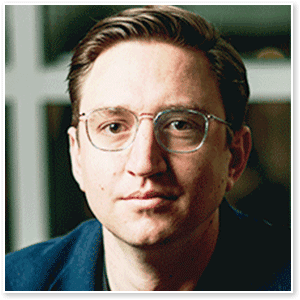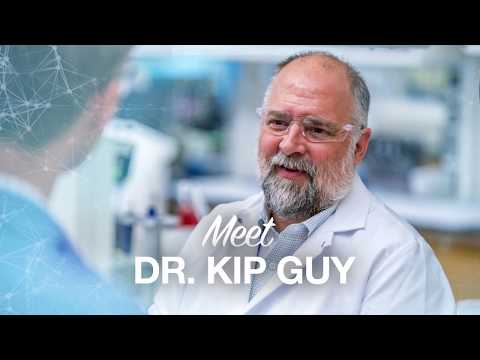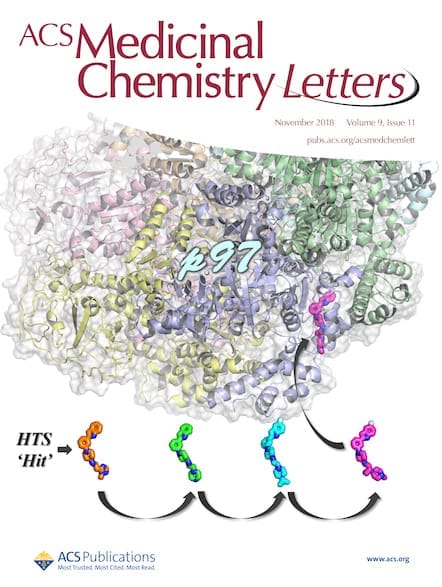Get to know more about the 2022 winners and their research.

The Editors of Journal of Medicinal Chemistry (JMC), ACS Medicinal Chemistry Letters (MCL), and the ACS Division of Medicinal Chemistry (MEDI) are pleased to announce the winners of the 2022 Philip S. Portoghese Journal of Medicinal Chemistry/ACS Medicinal Chemistry Letters/Division of Medicinal Chemistry Joint Lectureship Awards:
- Young Investigator: Michael Bollong, The Scripps Research Institute, USA
- Senior Medicinal Chemist: Kip Guy, University of Kentucky, USA
These annual awards are named in honor of Professor Phil Portoghese who served as Editor-in-Chief of JMC from 1972 to 2011 and are presented at ACS Fall. The Young Investigator Award is given to a researcher who has displayed impact and/or promise of impact to the field of medicinal chemistry. The Senior Medicinal Chemist Award is given to an established scientist whose work has had a profound impact on the field and practice of medicinal chemistry.
If you’re attending ACS Fall 2022 in Chicago, you’re invited to come see the winners speak at the award symposium, which will be hosted by MEDI on Sunday, August 21, 2 p.m. to 5:45 p.m. in room W182 of the McCormick Place Convention Center.
Read on to learn more about the winners.
Michael Bollong

Michael J. Bollong is the Early Career Endowed Roon Chair for Cardiovascular Research and an assistant professor in the Department of Chemistry at The Scripps Research Institute in La Jolla, California.
We asked Dr. Bollong to tell us more about himself. The answers he gave are below.
What inspired you to pursue your area of research?
It was the fantastic science being done here at Scripps Research, which made want to become a scientist and which established my laboratory’s initial research trajectory. As an undergraduate, I had the unique opportunity to work in the laboratory of Pete Schultz. At the time, we were identifying small molecules that could aid in the reprogramming of fibroblasts into induced pluripotent stem cells. Seeing that a cell’s fate can be fundamentally changed by a drug like small molecule was a watershed moment for me, one that ultimately catalyzed my career-long interest in developing small molecules for regenerative medicine.
Describe a key turning point in your research.
While I have always had interest in manipulating the fate of cells with drug like small molecules, it was during my experience as the inaugural Scripps Fellow that changed how my laboratory thinks about developing drugs for regenerative medicine. During this period, my group and I were able to explore a key question: Can we identify chemical matter that promotes regenerative organ repair via induced proliferation? The profound physiological effects these molecules were inducing lead us to focus on this paradigm almost exclusively in the laboratory.
If you weren’t a medicinal chemist, what would you be?
Getting to explore the unknown is what I value most about being a scientist. If I couldn’t explore cells using chemistry, I imagine I would satisfy this desire for discovery in the ‘macro world’ by being an archeologist or deep-sea explorer.
R. Kip Guy

We asked Dr. Guy to tell us more about himself. The answers he gave are below.
What inspired you to pursue your area of research?
Dr. Guy shared this video from 2018 where he answered this question.
Describe a key turning point in your research.
A key turning point in my research was a collaboration with Joe DeRisi’s lab at UCSF where we developed methods for studying the effects of drugs on living co-cultures of malaria. We originally did that to study mechanism, but the methods were eventually adapted to both lead identification and lead optimization.
This approach allowed us to develop and optimize potent, selective, and bioavailable compounds without understanding their mechanism. It became the foundation for the candidate we have in Phase 2 for the treatment of malaria and paved the road for similar developments in a wide range of diseases.
If you weren’t a medicinal chemist, what would you be?
If I weren’t a medicinal chemist, I think I would be an architect/builder or a cabinet maker. I enjoy the interplay of design, engineering, and working with my hands that comes with all three of those jobs; and they play well to my skills of three-dimensional visualization.

